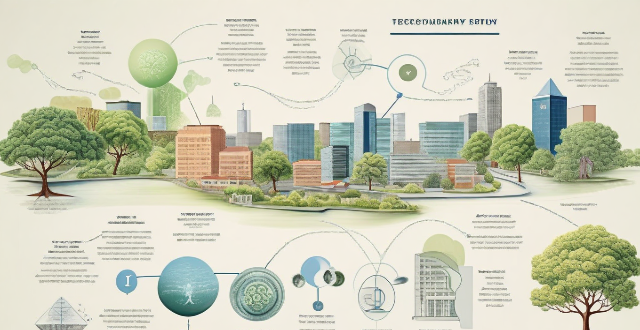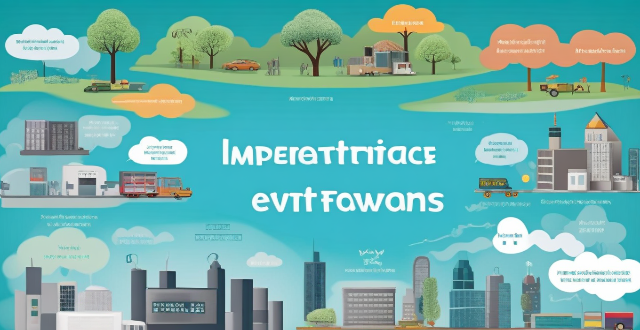Environmental Cooperation

How can climate cooperation contribute to sustainable development goals ?
Climate cooperation plays a crucial role in achieving the United Nations' Sustainable Development Goals (SDGs), which aim to ensure that all people have access to the resources they need to live healthy, productive, and sustainable lives. By working together on climate action, nations can make significant progress towards several SDGs, including those related to poverty, hunger, health, education, gender equality, clean water and sanitation, affordable and clean energy, economic growth, and partnerships for the goals. Climate cooperation helps reduce the impacts of extreme weather events, natural disasters, and climate change on vulnerable communities, thereby contributing to poverty eradication efforts. It supports sustainable agricultural practices and promotes resilient food systems, ensuring food security and nutrition for all. Climate action helps reduce air pollution and improve public health outcomes, contributing to better respiratory health and overall well-being. Engaging women and girls in climate actions promotes gender equality by providing opportunities for leadership and participation in decision-making processes. Climate cooperation helps protect water resources from climate-related hazards, ensuring access to clean water and sanitation for all. Collaborative efforts in renewable energy research, development, and deployment contribute to universal access to affordable, reliable, and modern energy services. Climate cooperation creates green jobs and promotes sustainable economic growth, particularly in industries such as renewable energy and sustainable agriculture. Partnerships formed through climate cooperation drive innovation in sustainable technologies and infrastructure, fostering industrial development while minimizing environmental impacts. By addressing climate change, which disproportionately affects marginalized communities, climate cooperation helps reduce social and economic inequalities both within and among countries. Climate actions support urban planning and management that enhances inclusivity, resilience, and environmental sustainability in cities and human settlements. Climate cooperation encourages responsible consumption patterns and sustainable production methods, reducing waste and environmental degradation. This goal is directly linked to climate cooperation as it involves taking urgent action to combat climate change and its impacts. Through ocean conservation and sustainable fishing practices, climate cooperation helps protect marine ecosystems and biodiversity. By promoting sustainable land use and forest management, climate cooperation contributes to the conservation of terrestrial ecosystems and biodiversity. Climate cooperation builds peaceful societies and effective governance structures capable of managing environmental challenges and conflicts arising from resource scarcity. Climate cooperation itself is a form of international partnership that leverages collective action to achieve the SDGs more effectively. In conclusion, climate cooperation is not only essential for mitigating the effects of climate change but also for advancing the broader agenda of sustainable development. By integrating climate actions into national policies and international collaborations, we can work towards a future where environmental protection, social equity, and economic prosperity are mutually reinforcing goals.

How does environmental legislation differ across countries ?
Environmental legislation varies across countries due to differences in economic development, political systems, cultural values, and environmental priorities. The legal framework for environmental protection ranges from comprehensive laws covering various issues to piecemeal legislation addressing specific problems. Enforcement mechanisms also differ, with some countries having strong regulatory bodies and others lacking institutional capacity or political will. Penalties and sanctions for non-compliance vary widely, as do opportunities for public participation in decision-making processes. International cooperation is crucial but varies in commitment and action among countries. Overall, these differences highlight the need for greater coordination and cooperation to address global environmental challenges effectively.

How can we improve international cooperation among nations ?
The text outlines ways to improve international cooperation among nations, including enhancing diplomatic relations through regular dialogues and cultural exchange programs; collaborating on global issues such as climate change, poverty, hunger, peace, and security; sharing knowledge and technology by research collaboration and protecting intellectual property rights; promoting trade and economic cooperation by reducing barriers, investing in infrastructure, and maintaining fair labor standards; and building capacity for global governance by strengthening institutions and supporting developing countries.

How has technology impacted international cooperation in recent years ?
The text discusses the impact of technology on international cooperation in various sectors such as communication, collaboration tools, access to information, globalization of trade and commerce, and environmental sustainability. Technology has improved communication through instant messaging, social media, and email, enhanced collaboration tools like project management software and video conferencing, increased access to information with open source data and online news sources, globalized trade and commerce through e-commerce platforms and digital payment systems, and promoted environmental sustainability with climate modeling and renewable energy technologies. Overall, technology has had a significant positive impact on international cooperation.

What role do international sports organizations play in fostering global cooperation ?
International sports organizations are crucial for global cooperation, promoting peace, cultural exchange, economic development, health, gender equality, environmental sustainability, and humanitarian aid.

Can you provide examples of successful international cooperation initiatives ?
Successful International Cooperation Initiatives International cooperation is a vital aspect of global progress, enabling countries to work together towards common goals. Here are some examples of successful international cooperation initiatives: 1\. The United Nations Framework Convention on Climate Change (UNFCCC) aims to stabilize greenhouse gas concentrations in the atmosphere at a level that prevents dangerous human interference with the climate system. It has been ratified by 197 parties, making it one of the most widely accepted international agreements. 2\. The World Health Organization (WHO) is the directing and coordinating authority on health within the United Nations system. It provides leadership, research, norms and standards, and technical support to countries worldwide. 3\. The International Space Station (ISS) is a joint project among five space agencies: NASA (United States), Roscosmos (Russia), JAXA (Japan), ESA (European Space Agency), and CSA (Canadian Space Agency). It serves as a microgravity and space environment research laboratory. 4\. The Convention on International Trade in Endangered Species (CITES) is an international agreement between governments aimed at ensuring that international trade in wild animals and plants does not threaten their survival. It regulates or bans trade in species listed in its appendices.

How does space exploration impact global cooperation and diplomacy ?
Space exploration has been a significant driver of global cooperation and diplomacy since the dawn of the space age. The pursuit of understanding our universe and the quest to explore beyond Earth's boundaries have fostered international collaboration, technological advancements, and diplomatic engagements that transcend traditional geopolitical tensions. In this discussion, we will delve into the various ways space exploration influences global cooperation and diplomacy.

Can international cooperation help mitigate climate-related conflicts ?
The text discusses how climate change can exacerbate conflicts and the role of international cooperation in mitigating these impacts. It outlines various challenges posed by climate change, such as water scarcity, food insecurity, natural disasters, and economic instability, and how they can lead to conflicts. The text then explores the potential roles of international cooperation, including diplomacy, technology transfer, financial support, education, and capacity building. It also highlights challenges to achieving effective international cooperation, such as political will, economic disparities, and cultural differences. Finally, the text concludes that international cooperation is essential in addressing climate-related conflicts and that collaborative efforts can lead to a more resilient and equitable world.

What is the role of international cooperation in achieving the Sustainable Development Goals ?
The text discusses the crucial role of international cooperation in achieving the Sustainable Development Goals (SDGs), which aim to address global challenges such as poverty, inequality, climate change, and environmental degradation. The SDGs cannot be achieved by individual countries alone but require collective action and collaboration at the global level. Key points include the need for global solutions to interconnected issues like climate change; sharing knowledge and best practices between countries; mobilizing financial resources and expertise; promoting policy coherence across sectors; and strengthening multilateral institutions like the United Nations. Examples of international cooperation in achieving the SDGs include climate change agreements like the Paris Agreement, global health initiatives against diseases like HIV/AIDS, tuberculosis, and malaria, and trade agreements that can promote sustainable development if designed correctly. Overall, international cooperation is an integral part of achieving the Sustainable Development Goals.

Can environmental legislation effectively reduce pollution ?
Environmental legislation has the potential to effectively reduce pollution, but its success depends on various factors such as enforcement and compliance, public awareness and participation, technological innovation, political will, international cooperation, and economic considerations. Strong regulatory bodies, education campaigns, investment in clean technology, government prioritization of environmental protection, global collaboration, and balancing environmental goals with economic development are all crucial for the effectiveness of environmental legislation. Achieving lasting improvements in environmental quality requires ongoing effort from all sectors of society.

How can international cooperation help address the challenges of climate change and energy security ?
The text discusses the importance of international cooperation in addressing climate change and energy security challenges. It highlights the benefits of sharing knowledge, joint research and development, implementing global agreements, and access to financing and investment. The text also suggests strategies for promoting clean energy technologies, strengthening policy frameworks, enhancing capacity building, and facilitating trade and investment. Overall, the text emphasizes that international cooperation is essential for creating a sustainable future.

Are there any drawbacks to implementing an ecological tax system ?
The article discusses the potential drawbacks of implementing an ecological tax system, which aims to promote environmental sustainability by imposing taxes on activities that harm the environment. The drawbacks include economic impacts on businesses and consumers, administrative challenges, social and political implications, and potential environmental drawbacks. Businesses may face increased production costs and reduced profit margins, while consumers may experience higher prices and reduced spending power. Administering and enforcing ecological taxes can be complex and resource-intensive, with potential for evasion and avoidance. Public acceptance and support may be lacking if the taxes are perceived as unfair or if they disproportionately affect certain groups. Political feasibility can also be a concern due to lobbying by interest groups and electoral concerns. Environmentally, there is a risk of carbon leakage and ineffectiveness in reducing overall pollution levels without global cooperation. The article concludes that a balanced approach considering both benefits and drawbacks, along with complementary policies and global cooperation, will be essential for achieving sustainable development goals.

How can international cooperation aid virus origin tracing efforts ?
The text discusses the importance of international cooperation in virus origin tracing efforts. It outlines various ways in which collaboration can aid this process, including sharing information and data through global databases and real-time reporting systems; pooling resources and expertise by establishing centralized laboratories and training programs; coordinating responses and policy making through global health organizations and international agreements; and building public trust through transparent communication and community engagement. The text emphasizes that successful virus origin tracing requires a multidisciplinary approach and the involvement of experts from different fields. It highlights the need for transparency, openness, and ethical considerations in research activities to ensure cultural sensitivity and community benefits. Overall, the text underscores the significance of international cooperation in unraveling the mysteries of virus origins and preventing future pandemics.

What are the most effective ways to promote environmental awareness ?
Promoting environmental awareness is crucial for the sustainable development of our planet. Effective ways to raise awareness about environmental issues include education and training through school curriculums, community workshops, and online courses; media and public outreach via social media campaigns, public service announcements, and documentaries; corporate responsibility initiatives such as green marketing, CSR programs, and partnerships with NGOs; and government policies and initiatives including environmental legislation, eco-friendly infrastructure, and international cooperation. By implementing these strategies, we can create a more informed and engaged global community committed to protecting our environment for future generations.

How do sports events promote interfaith understanding and cooperation ?
Sporting events serve as a platform for promoting interfaith understanding and cooperation by breaking down barriers, encouraging dialogue, building partnerships, and promoting peace. Through shared passion for sports, principles of sportsmanship, mixed teams, celebration of diversity, joint community projects, interfaith leagues, peace through play initiatives, and role models, sports events can contribute to a more harmonious society where interfaith cooperation is the norm.

What role does international cooperation play in enhancing global health security ?
In the realm of global health security, international cooperation plays a pivotal role. This collaboration among nations and organizations is crucial for addressing health challenges that transcend borders. Here's how international cooperation enhances global health security: ## Surveillance and Early Warning Systems - **Global Surveillance Networks**: By sharing information on disease patterns and potential threats, countries can work together to detect and respond to emerging health risks more effectively. - **Joint Research Efforts**: Collaborative research initiatives help to identify new pathogens and develop diagnostic tools, treatments, and vaccines. ## Strengthening Health Systems - **Capacity Building**: Weaker health systems can be supported through knowledge transfer, training programs, and infrastructure development. - **Resource Allocation**: International aid and funding can target areas most in need, improving healthcare access and quality. ## Coordinated Response to Health Crises - **Disaster Relief**: In times of crisis, such as natural disasters or large-scale outbreaks, international teams can provide urgently needed medical assistance. - **Policy Harmonization**: Aligning policies and procedures across countries ensures a cohesive approach to managing public health emergencies. ## Research and Innovation - **Technology Transfer**: The exchange of innovative medical technologies and practices can lead to better prevention and treatment options globally. - **Collaborative Trials**: Multi-country clinical trials accelerate the evaluation and adoption of new interventions. ## Education and Training - **Skill Development**: International educational programs prepare healthcare workers with the latest knowledge and skills. - **Public Awareness Campaigns**: Joint efforts in public health education can improve global health literacy and promote preventive measures. ## Norms and Standards - **Harmonization of Regulations**: Uniform standards for drugs, vaccines, and medical devices ensure quality and safety worldwide. - **Ethical Guidelines**: International ethical standards protect research participants and ensure the integrity of scientific endeavors. ## Financial Support - **Investment in Health**: International financing mechanisms provide critical funding for health programs. - **Economic Stabilization**: Financial support during health crises can prevent economic collapse in affected regions. ## Information Sharing - **Transparency**: Open communication about health issues encourages trust and cooperation among nations. - **Best Practices**: Sharing successful strategies helps all countries learn from each other's accomplishments and mistakes.

How can climate and environmental policies be designed to promote sustainable economic growth ?
This text discusses the integration of environmental considerations into economic planning, promoting renewable energy sources, encouraging energy efficiency, supporting green infrastructure, promoting circular economy practices, strengthening environmental regulations, and fostering international cooperation to promote sustainable economic growth.

What is the role of international cooperation in shaping renewable energy policies ?
The text discusses the importance of international cooperation in developing renewable energy policies worldwide. It highlights three main benefits: sharing knowledge and best practices, accessing financing and investment opportunities, and addressing global challenges such as climate change, air pollution, and energy security. Examples are provided for each benefit, including technical workshops, research collaborations, policy forums, multilateral development bank loans, green bonds, private sector partnerships, climate change agreements, joint research efforts, and energy security initiatives. The conclusion emphasizes that international cooperation is crucial for accelerating the transition to a more sustainable and equitable energy system.

How effective are ecological taxes in reducing environmental pollution ?
Ecological taxes, also known as environmental or green taxes, aim to reduce pollution and promote sustainable practices by making polluting activities more expensive than environmentally friendly alternatives. The effectiveness of these taxes depends on factors such as tax rates, revenue use, public awareness, and international cooperation. Case studies show that carbon taxes, plastic bag taxes, and waste taxes can lead to reduced emissions and waste, but challenges include revenue neutrality, equity concerns, and the need for global agreements. To maximize their impact, ecological taxes should be part of a broader strategy that includes regulatory measures, public education, and support for green innovations. Recommendations for effective implementation include ensuring adequate tax rates, allocating revenue for environmental initiatives, increasing public awareness, protecting low-income earners, and fostering international collaboration.

What role do international agreements play in shaping national climate and environmental policies ?
International agreements significantly influence national climate and environmental policies by providing a platform for global collaboration, setting shared objectives, establishing guidelines, promoting cooperation, and enhancing transparency and accountability. Examples include the UNFCCC, CBD, Basel Convention, Montreal Protocol, and Ramsar Convention, which have shaped policies on climate change mitigation, biodiversity conservation, waste management, ozone layer protection, and wetland preservation, respectively. These agreements are crucial for addressing global environmental challenges and driving progress towards sustainability.

What role do governments play in environmental conservation efforts ?
Governments play a crucial role in environmental conservation efforts by creating and implementing policies, regulations, and programs that promote sustainable development and protect natural resources. They can contribute to environmental conservation through legislation and regulation, public awareness campaigns, financial incentives and subsidies, international cooperation, and conservation programs. By taking these actions, governments can help ensure a sustainable future for our planet.

How can environmental legislation be improved to better protect the planet ?
Environmental legislation is crucial for the planet's health and sustainable development. To improve it, enforcement mechanisms should be strengthened with more funding, stricter penalties, and public participation. Regulations should be updated regularly based on scientific advancements, adopting an interdisciplinary approach. Sustainable practices should be promoted through incentives for green technology, eco-labeling programs, and green procurement policies. Protecting vulnerable ecosystems requires expanding protected areas, funding restoration projects, and strengthening species conservation laws. Integrating climate change mitigation involves carbon pricing, renewable energy targets, and adaptation strategies. International cooperation should be enhanced through global agreements, shared resource management, and technology transfer. Communities should be educated and empowered through environmental education, community-based programs, and capacity building.

How does international environmental law address global warming ?
International environmental law plays a crucial role in addressing global warming by setting standards, encouraging cooperation, and promoting sustainable practices through treaties, agreements, and principles. The Framework Convention on Climate Change (UNFCCC), the Kyoto Protocol, and the Paris Agreement are key legal instruments that establish targets for reducing greenhouse gas emissions and provide mechanisms for compliance and financial support. Other initiatives such as Regional Seas Programmes, the Convention on Biological Diversity (CBD), and Forest Law Enforcement, Governance and Trade (FLEGT) also contribute to mitigating climate change. Challenges include enforcement, political will, and ensuring equity and justice in actions taken. As the fight against global warming continues, international environmental law must adapt to evolving scientific, political, and technological landscapes, requiring collaboration and innovation among nations.

How do low-income countries deal with issues related to climate change and environmental degradation ?
Low-income countries face challenges in addressing climate change and environmental degradation. They focus on building resilience through early warning systems, disaster risk reduction, infrastructure development, and resilient agricultural practices. Community-based approaches involve local communities in decision-making, capacity building, participatory planning, and integrating traditional knowledge. Mitigation efforts include investing in renewable energy, promoting energy efficiency, and implementing sustainable forestry practices. International cooperation involves financial assistance, technology transfer, and capacity building support. Policy frameworks guide actions on climate change and environmental protection through national policies, legislative measures, and public awareness campaigns.

Can national governments alone tackle the issue of climate change, or is international cooperation necessary for effective global climate governance ?
Climate change is a complex issue that requires global cooperation to effectively tackle. While national governments can implement policies and invest in research within their borders, the interconnectedness of climate change factors necessitates international collaboration. Global agreements, technology transfer, and financial support are crucial components of this cooperation. Ultimately, a combination of national efforts and international partnerships is needed for effective climate governance.

How can renewable energy policies be designed to maximize social and environmental benefits ?
Renewable energy policies are crucial for transitioning towards a sustainable future. To maximize social and environmental benefits, these policies must be carefully designed, considering various factors such as economic impacts, technological advancements, public acceptance, and environmental sustainability. Here's a detailed guide on how renewable energy policies can be structured to achieve the best outcomes: ## 1\. Setting Clear and Achievable Goals Clear objectives are fundamental for effective policymaking. These goals should be specific, measurable, achievable, relevant, and time-bound. ## 2\. Promoting Technological Innovation and Research Investments in research and development (R&D) are vital for advancing renewable technologies. Incentivize private sector R&D, provide public funding for research, and foster collaboration between academia and industry. ## 3\. Encouraging Public Participation and Awareness Engagement from the public is essential for the successful implementation of renewable energy policies. Educational campaigns, community involvement programs, and feedback mechanisms are key components. ## 4\. Implementing Economic Incentives Make renewable energy options more attractive through financial incentives such as feed-in tariffs, tax credits, and subsidies. ## 5\. Strengthening Legal and Regulatory Frameworks Establish clear regulations that support renewable energy adoption, including net metering laws, renewable portfolio standards, and building codes. ## 6\. Addressing Environmental Concerns Ensure that renewable energy projects minimize environmental impacts through environmental impact assessments, habitat protection measures, and sustainable land use practices. ## 7\. Supporting Infrastructure Development Invest in the necessary infrastructure to facilitate the growth of renewable energy, including transmission networks, storage solutions, and smart grids. ## 8\. Fostering International Cooperation Global collaboration is key to tackling climate change effectively. Facilitate the transfer of renewable energy technologies across borders, collaborate on international research efforts, and participate in treaties aimed at reducing carbon emissions and promoting renewable energy use globally.

How can developing countries benefit from international cooperation ?
Developing countries can benefit from international cooperation in multiple ways, including access to technology and innovation, economic growth and trade opportunities, improved healthcare and education, environmental sustainability, and political stability and peace. Technology transfer, research collaborations, capacity building, trade agreements, foreign direct investment, infrastructure development, medical aid, educational exchange programs, renewable energy projects, conservation efforts, clean technology transfer, conflict resolution, democratic institution building, and legal and judicial reform are some of the key areas where developing countries can gain from working with their international counterparts.

What are the benefits of international cooperation in solving global issues ?
International cooperation is vital for addressing global challenges, offering benefits such as pooled resources, enhanced security, sustainable development, scientific advancement, and fostering mutual understanding. By combining efforts, nations can achieve more significant progress towards peace, sustainability, and development than they could independently.

Can you explain the importance of continuous environmental monitoring ?
The article emphasizes the importance of continuous environmental monitoring, which involves regularly collecting data on various environmental factors such as air and water quality, soil conditions, and biodiversity. It helps identify potential issues early on, track long-term changes, support conservation efforts, enhance public awareness, and facilitate research and innovation. The author encourages everyone to stay informed about the state of their local environment and take action to protect it.

How can international cooperation on climate change contribute to global security ?
International cooperation on climate change is vital for global security. It helps mitigate environmental disasters, promotes economic stability and growth, enhances social cohesion and peace, facilitates technology and knowledge sharing, and strengthens global governance and diplomacy. Through joint efforts, nations can address one of the most pressing challenges of our time and secure a safer future for all.